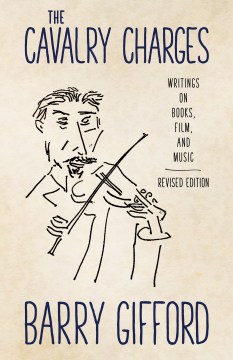By Steve Yates. Special to the Clarion-Ledger Sunday print edition (January 12)
 Mississippians are especially fortunate in that we likely have more independent bookstores per capita than any other state in the union.
Mississippians are especially fortunate in that we likely have more independent bookstores per capita than any other state in the union.
And one thing those bookstores do is bring in authors readers might otherwise miss. John Evans at Lemuria Books in Jackson has brought author, poet, and screenwriter Barry Gifford to Jackson many times since meeting Gifford at an American Booksellers Association meeting in Las Vegas in 1989. This was just before the movie Wild at Heart appeared, a film which Gifford co-wrote with famed director David Lynch.
Born in Chicago, Gifford is often now described as a Bay Area writer. But his writing and work have taken him all over the globe, including many times to the American South.
The Cavalry Charges: Writings on Books, Film, and Music (Revised Edition) (University Press of Mississippi) is a collection of reviews and reflections that shaped him as a writer to a wide range of books, films, television programs, and music. Within these essays, Gifford talks about his own work, his own film-making (not just with Lynch, but with Francis Ford Coppola, and Matt Dillon), and the film-making of others, including a nine-part dossier on Marlon Brando’s One-Eyed Jacks.
“The cavalry charges” is, according to Coppola, the most expensive three-word stage direction in all of screenwriting. You’ll have to read that essay. But don’t get the wrong idea. These essays are not about multi-million-dollar movie scenes in super expensive settings. They’re about art–making it, discovering it, relishing it, and ensuring that it continues.
Gifford rubs shoulders with the likes of Artie Shaw, Coppola, and Dillon, and even spots E.M. Forster shuffling to a Lenny Bruce performance near Cambridge (“wearing a cape,” Gifford observes, “[Forster] resembled a large anteater”). But his real delight is the reaction of a raw joy art can evince in the individual beholder.
In a fascinating essay about the movie Gifford and Dillon created, City of Ghosts, a Cambodian woman at a screening in Toronto admits to the filmmakers that she and a contingent of South Asians had just watched the film anticipating it would exploit her people and culture. But she found it thoughtful, even tender. Most important to Gifford’s collaborator Stellan Skarsgard was “Did you like it?” Gifford declares victory when the woman smiles and exclaims “Yes! It was very exciting!”
Gifford talks about where he was, what he was doing, who were his sidekicks or whom he was sidekick to when he encountered each book, or film, or musical figure he treats. Sidekicks, companions, and collaborators have played a huge part in every phase of Gifford’s life. And that comes through here repeatedly as he generously points them out and celebrates what friends and co-conspirators gave him.
University Press of Mississippi–which published Gifford’s Hotel Room Trilogy and Out of the Past: Adventures in Film Noir–published a revised edition of The Calvary Charges this winter in paperback.
New to the collection are four previously published essays: a brief look at the novels of Álvaro Mutis; a reflection on Gifford’s schooling at University of Missouri in Columbia under Nebraska poet John Neihardt; an essay on Hattiesburg’s Elliot Chaze and his superbly written novel Black Wings Has My Angel; and short glimpse of Gifford’s thieving, road-tripping characters for so many novels, Sailor and Lula hanging out together in Metarie and contemplating Andy Warhol, wigs, black and white photography, and Abita beer.
Time after time, Gifford says, essentially, do yourself a favor and read this, watch this, or listen to this. Follow his advice and enjoy it all in The Cavalry Charges.
Steve Yates of Flowood is the author of the novel The Legend of the Albino Farm from Unbridled Books, the Juniper Prize-winning Some Kinds of Love: Stories, and a recipient of The Quill Award from the Missouri Writers Hall of Fame.

